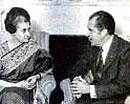
A secret State Department intelligence note, dated January 14, 1972, acknowledged that US policy had an impact on India's decision making on nuclear weapons, saying there was "little doubt" that the then president Richard Nixon's announcement of his trip to China changed New Delhi's calculations.
The late US president, who was forced to step down in the wake of Watergate scandal, had troubled relations with India because of his tilt towards Pakistan in the 1971 Indo-Pak war and his moves to reconcile with China.
Declassified American documents of the era reveal that as of early 1971, all evidence indicated that the Government of India had decided to defer indefinitely the development and explosion of a test device.
"In early August, however, the cabinet undertook a review of Indian nuclear policy in the wake of President Nixon's July 16 announcement of his proposed trip to China. There can be little doubt that the July 16 announcement has had major implications for India's security calculations and its nuclear policy," the six-page intelligence note said, which was released by the National Security Archive.
"In New Delhi's view, the announcement appeared to rule out all hope that India (not a signatory to the NPT) could anticipate a joint US-Soviet umbrella against the threat of Chinese nuclear attack," it said, adding that the decision to detonate a nuclear device may have been triggered by the deepening crisis in Indo-Pakistani relations.
"India may have concluded that an early test would demonstrate its increasing military strength to Pakistan and remind the latter's Chinese and American friends of its potential power," the intelligence note said.
"Although the immediate issue with Pakistan has been settled, a test still would probably be regarded as very useful by the Indians," it added.
The documents claim that US assessment was that a nuclear test would constitute dramatic support for India's contention that it is the only important power on the subcontinent.
"India also may hope that a demonstrated nuclear capability would quash any thoughts of revenge the Pakistanis might still entertain," the State department said.
Six months later in June 1972, the then Secretary of State, Henry Kissinger, wrote to president Nixon about intelligence reports which also came from other sources that India has decided to go nuclear.
"Such a test would likely affect the attitudes of the USSR and the People Republic of China toward South Asia, and would probably generate Pakistani pressures for enhanced security guarantees. Again, we should be carefully consider our position," Kissinger wrote in his note.
Analysing the latest round of declassified documents of the era, the National Security Archives writes that relations between New Delhi and Washington were already cool during the Nixon administration which treated India as a relatively low priority.
"Henry Kissinger's secret trip to China underlined India's low priority by suggesting that if New Delhi ever faced a crisis with Beijing it could not count on Washington for help, it said.